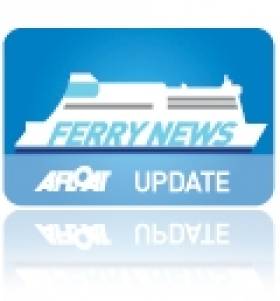Displaying items by tag: Ropax Cotentin
Stena Line replaces Former Irish Sea Ferry on Sweden-Poland Route
#BrittanyBaltic – Stena Line are to introduce a larger ro-pax vessel on the Karlskrona-Gdynia route next week with Stena Baltica II, the Brittany Ferries former freight-ferry Cotentin (2007/19,909gt), writes Jehan Ashmore.
The 2,188 lane metre ro-pax Stena Baltica II which as Cotentin ran French-UK-Iberian routes replaces Stena Alegra on the Karlskrona-Gdynia route. The vehicle stern-only loading 'Alegra' of 1,950 lane metres had only began operating in July. She originally entered service as Dawn Merchant in 1999 for Merchant Ferries Dublin-Liverpool service.
Cotentin was built by Aker Finnyards, Helsinki and her return to the Baltic Sea sees the 210 -passenger ro-pax launch the Sweden-Poland route to meet the growing demand for increased freight deck capacity. The 163m long vessel with accommodation for 120 freight-drivers has the ability to load both bow and aft, so-called double tier loading and drive-through on both decks.
Tony Michaelsen, Route Manager Karlskrona-Gdynia said: "We are pleased to have a long-term solution in place that enables us to meet the growing needs of our customers, providing increased flexibility and a greater loading capacity. We have huge demand for capacity on the route and require a third vessel to be able to take care of all the cargo.
Freight volumes between Sweden and Poland have continued to grow. Up to October 2013, freight volumes have increased by 18%, car volumes by 7% and passenger volumes by 9% compared with the same period in 2012.
Michaelsen added, "We expect this trend to continue in the coming years as economic development in Poland and Eastern Europe remains very strong".
Stena Baltica takes over the 'Allegra's schedule by operating three departures a week from Karlskrona and Gdynia. She starts sailings on 24 November with a departure from the Polish port and will operate alongside Stena Vision and Stena Spirit which run regular schedules.
The previous Stena Baltica operated on the same service when the Rosslare-Fishguard ferry Koningin Beatrix was transferred in 2002 to Scandinavia. Her direct replacement Stena Europe currently maintains the St. Georges Channel route. The original 'Baltica' served alongside Stena Nordica which now runs between Dublin Port and Holyhead.
























































